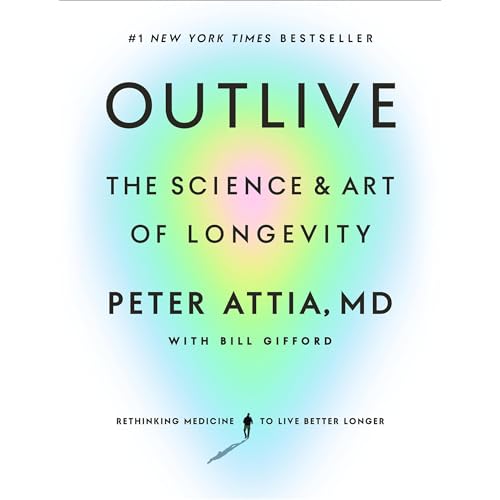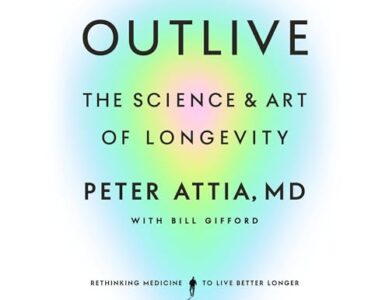These are the quotes I noted while reading Outlive: The Science and Art of Longevity by Peter Attia, MD:
“There comes a point where we need to stop just pulling people out of the river. We need to go upstream and find out why they’re falling in.” – Bishop Desmond Tutu
- None of our treatments for late-stage lung cancer has reduced mortality by nearly as much as the worldwide reduction in smoking that has occurred over the last two decades, thanks in part to widespread smoking bans.
- You can’t use a tool that’s not yet been invented.
- Most Important Tactics for Health
- Exercise
- Nutrition
- Sleep
- Emotional Health
- “Why would you want to live longer if you’re so unhappy?”
- Drugs, supplements, and hormones
- The older you get, the healthier you have been.
- More muscle mass, on average, is correlated to longer lifespan and better function.
- How much food we eat correlates somehow with how long we live.
- Rapamycin seems to reduce systemic inflammation.
- “Avoidable human misery is more often caused not so much by stupidity as by ignorance, particularly our ignorance about ourselves.” – Carl Sagan
- The logical first step in our quest to delay death is to get our metabolic house in order.
- “There is some risk involved in action, there always is. But there is far more risk in failure to act.” – Harry S. Truman
- “Cholesterol in the diet doesn’t matter at all unless you happen to be a chicken or a rabbit” – Ancel Keys
- I have all my patients tested for apoB regularly, and you should ask for the same test next time you see your doctor.
- Smoking cessation and blood pressure control are non-negotiable first steps in reducing cardiovascular risk.
- Our benchmark for success in a patient, or remission, is typically five-year survival, nothing more. We don’t dare utter the word cure.
- Cancer cells don’t grow faster than their noncancerous counterparts; they just don’t stop growing when they’re supposed to.
- Chemotherapy occupies a fuzzy region between poison and medicine; the mustard gas used as a weapon during WWI was a direct precursor to some of the earliest chemotherapy agents, some of which are still in use.
- Just because cancer is powerful doesn’t mean it is invincible.
- Excess weight is a leading risk factor for both cancer cases and deaths, second only to smoking.
- About 12 to 13% of all cancer cases are thought to be attributable to obesity.
- Extreme obesity is associated with a 52% greater risk of death from all cancers in men, and 62% in women.
- A fasting-like diet increases the ability of normal cells to resist chemotherapy, while rendering cancer cells more vulnerable to the treatment.
- “The greatest obstacle to discovery is not ignorance, it is the illusion of knowledge.” – Daniel J. Boorstin
- People with better movement patterns, and a longer history of moving their bodies, tend to resist or slow the progression of Parkinson’s disease as compared to sedentary people.
- Sleep is when our brain heals itself.
- Another surprising intervention that may help reduce systemic inflammation, and possibly Alzheimer’s disease risk, is brushing and flossing one’s teeth.
- “I never won a fight in the ring; I always won in preparation.” – Muhammad Ali
- Exercise has the greatest power to determine how you will live out the rest of your life.
- Going from zero weekly exercise to just ninety minutes per week can reduce your risk of dying from all causes by 14%.
- Study after study has found that regular exercisers live as much as a decade longer than sedentary people.
- The data demonstrating the effectiveness of exercise on lifespan are as close to irrefutable as one can find in all human biology. I think exercise is even more effective at preserving healthspan.
- Muscle helps us survive old age.
- “It is impossible to produce superior performance unless you do something different from the majority.” Sir John Templeton
- I think of strength training as a form of retirement saving.
- From the standpoint of pure efficacy, caloric restriction is the winner, hands down.
- The quality of your diet may matter as much as the quantity.
- Brown rice is only slightly less glycemic than long-grain white rice.
- A good vs. bad night of sleep makes a wolrd of difference in terms of glucose control… It appears that sleeping just 5-6 hours (vs. 8) accounts for about a 10 to 20 mg/dL (that’s a lot!) jump in peak glucose response.
- Nonstarchy veggies such as spinach or broccoli have virtually no impact on blood sugar. Have at them.
- Sleep, the best medicine for your brain.
- Many studies have found powerful associations between insufficient sleep (less than 7 hours a night, on average) and adverse health outcomes ranging from increased susceptibility to the common cold to dying of a heart attack.
- As important as sleep is for the body, it may even be more so for the brain.
- People who are sleep deprived almost always underestimate its effects on them because they adapt to it.
- Studies show that people who are more sleep deprived tend to have a higher likelihood of indulging in a fourth meal late in the evening.
- Short sleep (less than 6 hours a night) is associated with about a 6 to 26% increase in cardiovascular disease.
- Sleep medications such as Ambien and Lunesta do not promote healthy, long-lasting sleep so much as they tend to promote a sleep-like state of unconsciousness that does not really accomplish much if any of the brain healing work of either REM or deep sleep.
- The first requirement for good sleep is darkness.
- Try to keep your bedroom cool-around 65 degrees Fahrenheit seems to be optimal.
- Most people think of caffeine as a stimulant that somehow gives us energy, but it actually functions more as a sleep blocker.
- Don’t eat anything less than three hours before bedtime- and ideally longer. It’s best to go to bed with just a little bit of hunger (although being ravenous can be distracting.)
- “Religion is for people who are afraid of Hell. Spirituality is for people who have been there.”
- Emotional health and physical health are closely intertwined, but they’re not the same thing.
- Children don’t respond to a parent’s anger in a logical way. If they see me screaming at a driver who just cut me off, they internalize that rage as though it were directed to them.
- “Family pathology rolls from generation to generation like a fire in the woods taking down everything in its path until one person, in one generation, has the courage to turn and face flames. That person brings peace to his ancestors and spares the children that follow.”
- “Resume virtues” vs. “Eulogy virtues”
- “We suffer more often in imagination than in reality.” – Seneca
- Changing the behavior can change the mood.
- “People get old when they stop thinking about the future. If you want to find someone’s true age, listen to them. If they talk about the past and they talk about all the things that happened, that they did, they’ve gotten old. If they think about their dreams, their aspirations, what they’re still looking forward to-they’re young.”

